
RST Apology to Tasmanian Aboriginal people 2021.

RST Apology to Tasmanian Aboriginal people 2021.
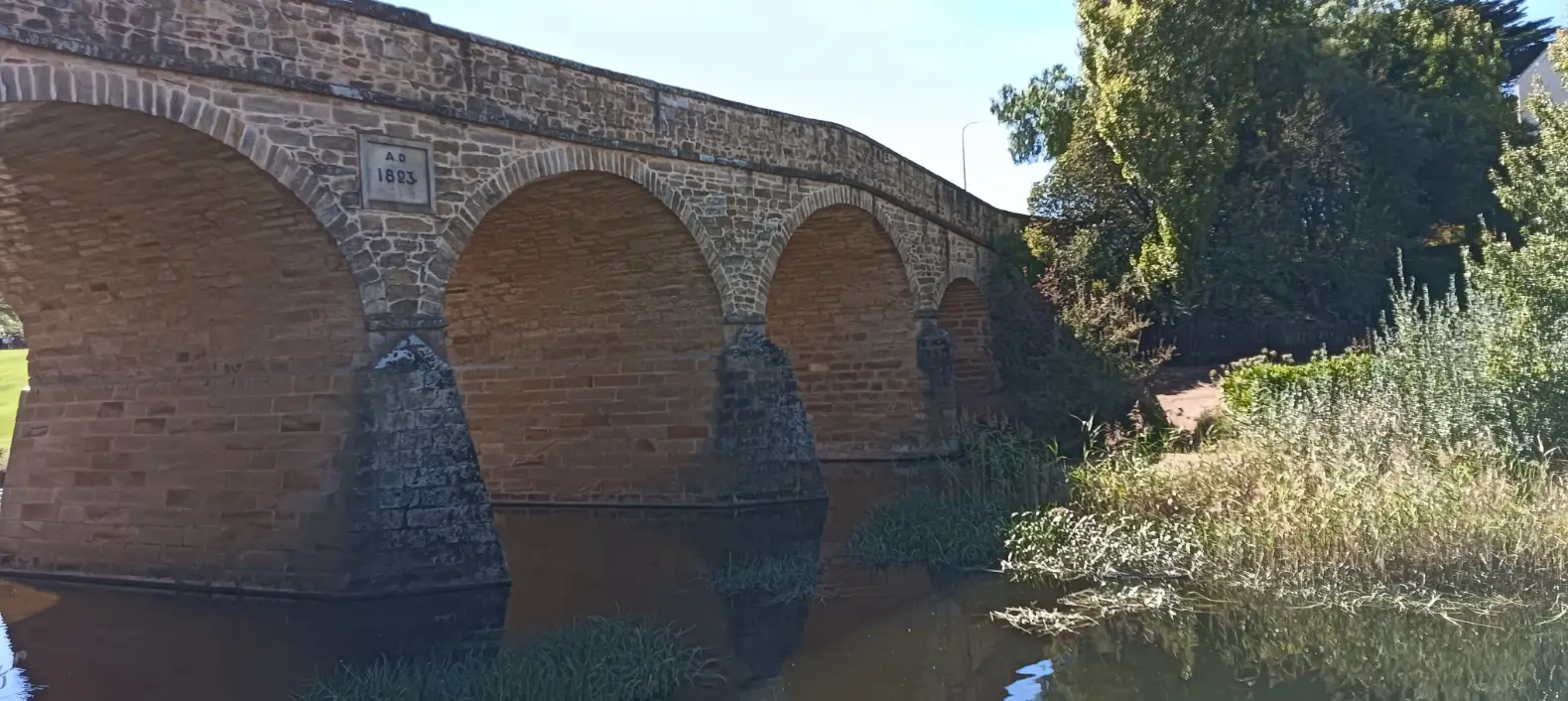
Revised June 2017 by Hon. Secretary (Dr John G. Thorne AM, FACEA).
Revised March 2011, December 2021, May 2022 by Honours Committee: Chair (Prof. Jocelyn McPhie).
Revised March 2024 by Honours Committee: Chair (Prof Richard Coleman)
Members should be or should have recently been:
Members should collectively cover a wide spectrum of research disciplines. The Committee can co-opt experts from other fields when needed. All members of the Honours Committee should normally be members of the Society.
Seven awards are available. All have been introduced by the Honours Committee and ratified by Council and the Membership.
Established 9 March 1920
Awarded to a scholar of great distinction in any field within the Society’s purview.
A connection with scholarship in Tasmania is an advantage.
The Awardee will deliver the ‘RM Johnston Memorial Lecture’. If not a member of the Society, the Awardee will be offered free membership for one year.
See also Appendix A.
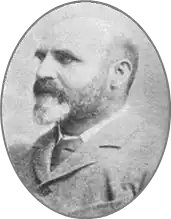
Established 9 May 1927
Awarded to a scholar for substantial original research in any subject within the Society’s purview.
A significant part of the research shall have been conducted while the Awardee was a resident of Tasmania.
The Awardee must have been, in the view of the Council, an active member of the Society for at least five years.
The Awardee will deliver ‘The Royal Society of Tasmania Lecture’.
The minimum requirement of an ‘active’ member should be one or more of the following:
When more than one nominee meets the criteria for ‘active’ membership, precedence shall be given to the quality of the scholarship.
See also Appendix A.
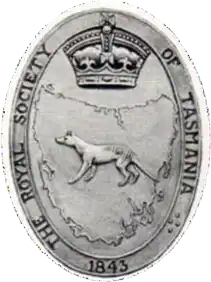
Established July 1930
Awarded to a scholar distinguished for research in Tasmanian science or Tasmanian history.
The Award will alternate between the fields of science and history, unless particular circumstances dictate otherwise.
The awardee will deliver the ‘Clive Lord Memorial Lecture’.
If not a member of the Society, the awardee will be offered free membership for one year.
See also Appendix A.
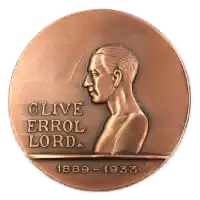
Established March 1997
Awarded to a scholar of distinction in mid-career in any field within the Society’s purview.
See also Appendix B for conditions of the Award.

Established 2017 (first year of conferring in 2018)
Awarded biennially to an outstanding early career researcher. The research is to have been largely carried out in Tasmania or under the aegis of a Tasmanian-based organisation and within the Society’s purview. For the purpose of the medal, ‘early career’ is taken to mean that the time since the award of a PhD, at the Award nomination deadline, is between three (3) and less than eight (8) years or eight years equivalent full-time. The Honours Committee retains the right to exercise discretion in the application of this condition. A medal will be presented and the recipient may be requested to deliver the ‘Peter Smith Lecture’ to the Society.

Established August 2023 (first year of conferring in 2024)
To be awarded every four years to a person who excels in any area within the arts or humanities or both, with outstanding contributions evidenced by creative outputs. The Honours Committee retains the right to exercise discretion in the application of this condition. The Medal honours Louisa Anne Meredith’s contributions to the areas of natural history art, scientific art, literature, and history and is to commemorate the person’s exceptional whole-of-career achievements. After the conferring of the Award, the recipient may be invited to address the Society by delivering the ‘Louisa Anne Meredith Lecture’.
See also Appendix C for conditions of the Award.
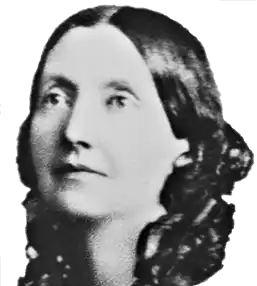
Established September 1998
Awarded annually in any fields within the Society’s purview.
No more than three years or three years equivalent full-time shall have passed since the award of the nominee’s PhD.
For full details, see Appendix D.
Historically, for the three older Awards (that is, RM Johnston Memorial Medal, The Royal Society of Tasmania Medal and the Clive Lord Medal) no guidelines on frequency of bestowal were given (see Appendix A: Memorial Funds, Honours, Medals and Awards). The four more recent Awards (MR Banks Medal, the Peter Smith Medal, the Louisa Anne Meredith Medal and the Doctoral Awards) have suggested frequencies. A schedule has been established that offers guidelines for the presentation of all the awards (see Appendix E). Guidelines for a timetable for Award bestowal suggested by the Honours Committee and ratified by Council are:
The above guidelines permit some flexibility in Award frequency. For example, more frequent bestowal could occur if circumstances indicate (e.g. special events or applicants). Less frequent bestowal could be due to the lack of appropriate nominees.
Normally a period of five years should elapse before an Awardee can receive a further Award from the Society. See https://rst.org.au/awards/past-recipients/ for past Awardees.
No self-nominations for any Award are allowed. For Medals: Nominations shall be sought by open notice to all members of The Royal Society of Tasmania. The Honours Committee will exercise the function of a ‘search committee, considering further applicants prompted by its own deliberations. For the Doctoral Awards: Nominations shall be widely sought from supervisors of potential nominees in Tasmania’s research institutions. Members of the Honours Committee may act as nominators for the Doctoral Award through their role as supervisors but will be absent from the final selection. A pro forma for all award nominations (Appendix F) should ensure consistency of information provided to the Honours Committee for all nominees.
| Call for Nominations | Nominations close | Recommendations of Awards to Council | |
| Medals | 30 June | 31 August | 15 November |
| Doctoral Award | 1 October | 15 November | 31 January |
All matters pertaining to the Society awards and the Honours Committee deliberations are confidential. The Honours Committee recommendations must be ratified by Council and all nominators must be informed of the outcome before public announcement of award winners.
The Honours Committee wishes Council and the Membership to know that the aim in producing and revising this document is both to ensure that fair and meritorious Awards are made to the best nominees available and to support the advancement of knowledge of the highest calibre. These guidelines should be reviewed by the Honours Committee and Council every five years or as circumstances dictate.
Past recipients of all RST Medals and Awards since 1923 are listed against each award. You can view the awards here. Click an award to learn more and view the list of recipients.
All previous Rules and Regulations referring to the RM Johnston Memorial Medal, the Clive Lord Memorial Medal and The Royal Society of Tasmania Medal are cancelled. Administration and determination of the award of the RM Johnston, Louisa Anne Meredith, Clive Lord and The Royal Society Medals are at the discretion of the Council. The award of one or other Medal should be a regular event in the life of the Society.
The Award is to honour Dr Maxwell R Banks’ contribution to science and The Royal Society of Tasmania. The conditions of the Award are:
The Award is to honour Louisa Anne Meredith’s contribution to the areas of natural history art, scientific art, literature, and history and is to commemorate the exceptional whole-of-career contributions by a person in any area within the arts or humanities or both.
The conditions of the Award are:
The Royal Society of Tasmania has instituted this Award to honour two doctoral (PhD) graduates who have made significant advances in the course of their doctoral research.
The conditions of this Award are:
Nominations to be submitted online as advised by the nominated due date.
All applications must include:
Receipt of nominations must be no later than 15 November in each year. The Awards will be announced at the Society’s Annual General Meeting in Hobart in March the following year.
| Year | RST Annual Doctoral (PhD) Award | Louisa Anne Meredith Medal | MR Banks Medal | Clive Lord Memorial Medal | Royal Society of Tasmania Medal | RM Johnston Memorial Medal | Peter Smith Medal |
|---|---|---|---|---|---|---|---|
| 2025 | X | X | X | X | |||
| 2026 | X | X | X | ||||
| 2027 | X | X | |||||
| 2028 | X | X | X | X | |||
| 2029 | X | X | X | ||||
| 2030 | X | X |
The following is a guide for nominating candidates for The Royal Society of Tasmania Medals;
The first page of the nomination should list:
No self-nominations are allowed.
The description of the nominees’ achievement relevant to the particular medal should follow. It should be no more than one page and should be written concisely and in language that is widely understood outside the nominee’s field of research. The nominee’s research or other scholarly contributions to science, history or other field of learning, industry or society should be clearly stated.
A full curriculum vitae for the Honours Committee should be given. It should include the nominee’s date of birth, the date/s of receipt of degrees and a full list of publications and/or other outputs. Highlight the most significant outputs with an asterisk. Nominations for the RM Johnston medal or The Royal Society of Tasmania medal should provide a list of the nominee’s ten (10) best career publications, with a short context statement about the research impact and contributions to the field of the chosen publication. For all co-authorised publications, including first-author publications, the nominee’s role in those publications should be indicated as a percentage.
The Honours Committee of the Royal Society of Tasmania has limited ability to seek additional information and therefore depends on the nomination papers to provide a full and fair account of the nominee’s suitability, taking into account the criteria of the particular medal applied for.
All nominations should be emailed to the Honorary Secretary of the Society ([email protected]) by the due date.
All matters pertaining to the Society awards and the Honours Committee deliberations are confidential. The Honours Committee recommendations must be ratified by Council and all nominators must be informed of the outcome before public announcement of award winners.
Memorial Funds, Honours, Medals and Awards
(Some years ago, with Supreme Court permission, all the following funds were consolidated into The Royal Society of Tasmania general funds. Information on each bequest and award is provided below for historical record.)
The Rules and Regulations referring to the RM Johnston Memorial, the Clive Lord Memorial, and The Royal Society of Tasmania Medal are those agreed to from time to time by the Council of The Royal Society of Tasmania. Administration and determination of the award of the RM Johnston, the Clive Lord, and The Royal Society of Tasmania medals are at the discretion of the Council. The award of each Medal should be a regular event in the life of the Society, one such award desirably occurring every two or three years. This statement is not meant to impose any periodic regularity on the award of The Royal Society of Tasmania Medal.
Morton Allport Memorial
Established 2 May 1879. Amount of original fund, £200 ($400).
The income from the Fund to be applied to the purchase of scientific books for the Society’s Library, the books to be stamped to perpetuate the memory of Morton Allport.
R M Johnston Memorial
Established 9 March 1920. Amount of original Fund, £231.5.4 ($462.53) (balance remaining after providing six medals)
The income from the fund to be used as follows:
The Royal Society of Tasmania
Established 9 May 1927.
To be awarded to a scholar who has carried out prolonged original research in any subject within the Society’s purview. The recipient shall have been a resident of Tasmania during the period of this research and for the past five years have been in the view of the Council an active member of the Society.
Clive Lord Memorial
Established July 1934. Amount of original fund , £200 ($400), balance remaining after provision of a die of the Memorial Medal and a Memorial Tablet in the Tasmanian Museum.
The income from the fund to be used to provide a Memorial Medal for a lecturer chosen to deliver the “Clive Lord Memorial Lecture”, the recipient being a scholar distinguished for research in Tasmanian science or history, and to meet other associated costs.
A H Clarke Legacy
Established 8 January 1945. Amount of original bequest, £100 ($200).
Purpose of Fund: Interest arising from investment of the legacy to be used for the purchase of books and library upkeep.
Arndell Neil Lewis Memorial
Established 19 March 1947. Amount of original fund , £232.17.11 ($465.79) (plus the proceeds of subsequent sales of “Geology of the Hobart District”).
Purpose of Fund: the interest arising from the investment of the Fund to be used for the purchase of geological and other scientific books for the Society’s Library. Each book so purchased to have a special book-plate showing that the book is part of the AN Lewis Memorial Library.
W H Hudspeth Memorial Trust Fund
Established 30 June 1954. Amount of original fund , £175.19.6 ($351.95) (plus the proceeds of subsequent sales of the Hudspeth Memorial Volume “Early Van Diemen’s Land).
Purpose of Fund: For the purchase of historical volumes for the Royal Society Library, each volume to bear a book-late indicating that it is part of the Hudspeth Memorial.
Henry Oliver Bequest
Established 9 December 1954. Amount of original bequest, £100 ($200).
Purpose of Fund: to further the various objects of the Society.
Joseph Milligan Bequest
Established 1957. Amount of original bequest (from proceeds of the sale of land at Bicheno and George Town), £486.16.0 ($973.60).
Purpose of Fund: To further the various objects of the Society.
MR Banks Medal
Established March 1997.
Awarded to a scholar of distinction in mid-career in any field within the Society’s purview between 8 and a maximum of 15 years or 15 equivalent full-time years, post PhD graduation.
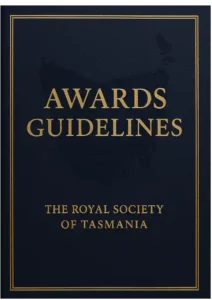

The Royal Society of Tasmania acknowledges, with deep respect, the traditional owners of this land, and the ongoing custodianship of the Aboriginal people of Tasmania. The Society pays respect to Elders past, present and emerging. We acknowledge that Tasmanian Aboriginal Peoples have survived severe and unjust impacts resulting from invasion and dispossession of their Country. As an institution dedicated to the advancement of knowledge, the Royal Society of Tasmania recognises Aboriginal cultural knowledge and practices and seeks to respect and honour these traditions and the deep understanding they represent.

On 15 February 2021, the Royal Society of Tasmania offered a formal Apology to the Tasmanian Aboriginal people.